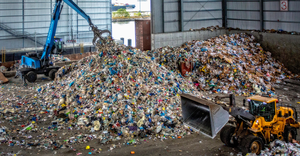international: Recycling is Standard in French Auto Industry
January 1, 1998
Andre Larane
Until the 1970s, French auto makers manufactured mostly steel cars, whose parts were easily recovered by steel producers. However, with the refinement of plastics and special alloys, the industry turned to these non-corroding composites: from approximately 33 pounds of plastic per car in the 1960s to more than 200 pounds of plastic per car today, or 12 percent of a vehicle's average weight.
"The introduction of plastic waste means [that] time is limited for the traditional recovery channels of scrap vehicles by scrap dealers," says Etienne Le Roy, an engineer at ADEME (Environment and Energy Control Agency). "This is because it is becoming ... difficult to separate the materials that have scrap value from those that do not."
Consequently - with cooperation from European car manufacturers Renault, Peugeot and Citroen; component manufacturers like Michelin (tires); Usinor, a European steel producer; plastic component manufacturers such as Plastic Omnium; and a multitude of smaller-sized suppliers - the country has developed new recycling industries. These industries, in turn, are inspiring legislators at the European Commission in Brussels and are being imitated by other European countries.
Wherever possible, corporate participants are committed to using recycled plastics in order to drive the recycling industries. For instance, in the latest Peugeot model, 406, polypropylene accounts for 80 percent of its plastics content. In fact, the company's bumpers now are manufactured almost entirely of polypropylene, whereas Peugeot's older models used no fewer than three types of plastics.
Also, a few years ago, bumper bodies and front panels were manufactured in thermosetting plastics, which are very difficult to recycle. Today, these parts are produced in thermoplastic materials. Its instrument panels also include components made of recycled ABS plastic.
"By 2002, all new vehicles will be 90 percent recyclable by weight," says Jean-Paul Vallat, Renault's recycling project manager. "And starting in 2015, all vehicles reaching the end of their life will be 95 percent recyclable." Currently, only 75 percent by weight of each vehicle produced worldwide is recyclable. The remainder, consisting of glass, plastic and elastomer crushing residue, is landfilled.
In 1992, Renault joined Compagnie Francaise des Ferrailles (CFF), a scrap metal recycler, to create a scrap vehicle dismantling and recovery center in the south of Paris. Using systematic dismantling methods, 85 percent of these vehicles are recycled and recovered. In 1995, the center reprocessed 45,000 vehicles, while recovering 130,000 used bumpers and the same number of batteries.
The batteries are sent to a lead reprocesser, Metaleurop, who recasts the lead and passes on the polypropylene fragments from the battery casings to its subsidiary, C2P. This company, located north of Lyons, then converts the casings into granules which are used by component manufacturers to produce new auto parts, such as bumpers.
Despite the steps taken by industry to reuse scrap from vehicles, though, some fraction of material must be incinerated.
A group of French companies - including the three major car manufacturers; Saint Gobain, a glass manufacturer; Elf, a petroleum company; and EDF, an electricity utility - are testing a new combustion technique that burns a mixture of household waste and crushed vehicle residue in Brittany. Developed by Cyclergie, the technique uses a truncated cone-shaped rolling furnace with a boiler to recover the heat.
And, at its scrap vehicle dismantling and recovery center, CFF, along with Peugeot, has its unusable vehicle remains converted into a high calorie value fuel and then is burned in a neighboring cement kiln.
Additionally, in eastern France, Ciments d'Origny collects and recycles energy from used tires. The company has modified its Altkirch cement works' kiln for the automatic feeding of shredded tires.
When the process is carried out correctly, incinerating crushing residue satisfies the recycling industry and its partners as well as the public authorities.
For more information, contact: French Technology Press Office, One East Wacker Drive, Suite 3740, Chicago, IL 60601. Fax: (312) 222-1237.
New Company Denver-based Geraghty & Miller has formed a new company that will offer soil remediation and reclamation services to government, industrial and commercial markets. This new company, Earthline Technologies, L.L.C, is a 50/50 joint venture between Geraghty and RMI Titanium Co., Niles, Ohio.
New Office Camp Dresser & McKee Inc. (CDM), Cambridge, Mass., has opened a new office in Nashville, Tenn. This location will provide CDM's full suite of environmental services to municipal entities as well as private industry, and will work closely with its other regional locations, including Atlanta, Raleigh (N.C.), Charlotte (N.C.) and Louisville, Ky.
You May Also Like


